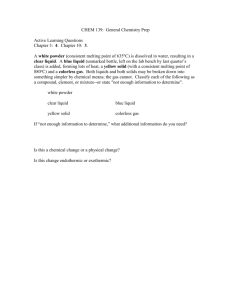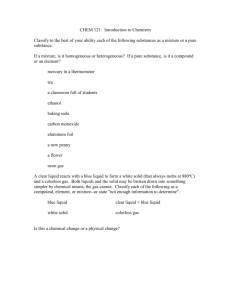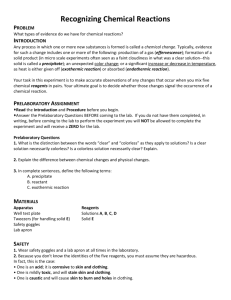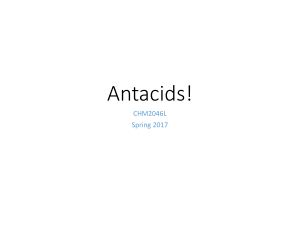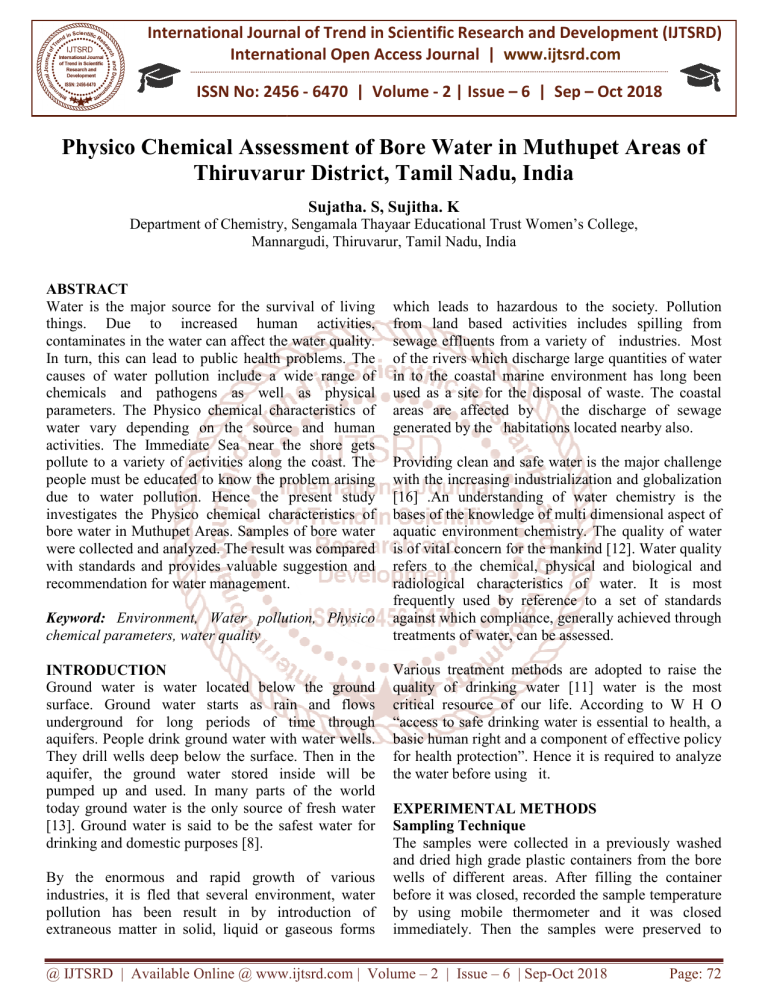
International Journal of Trend in Scientific Research and Development (IJTSRD)
International Open Access Journal | www.ijtsrd.com
ISSN No: 2456 - 6470 | Volume - 2 | Issue – 6 | Sep – Oct 2018
Physico Chemical Assessment of Bore Water in Muthupet Areas of
Thiruvarur
rur District
District, Tamil Nadu, India
Sujatha. S, Sujitha. K
Department of Chemistry,, Sengamala Thayaar Educational Trust Women’s College,
College
Mannargudi
Mannargudi, Thiruvarur, Tamil Nadu, India
ABSTRACT
Water is the major source for the survival of living
things. Due to increased human activities,
contaminates in the water can affect the water quality.
In turn, this can lead to public health problems. The
causes of water pollution include a wide ran
range of
chemicals and pathogens as well as physical
parameters. The Physico chemical characteristics of
water vary depending on the source and human
activities. The Immediate Sea near the shore gets
pollute to a variety of activities along the coast. The
people
ple must be educated to know the problem arising
due to water pollution. Hence the present study
investigates the Physico chemical characteristics of
bore water in Muthupet Areas. Samples of bore water
were collected and analyzed. The result was compared
with
ith standards and provides valuable suggestion and
recommendation for water management.
Keyword: Environment, Water pollution, Physico
chemical parameters, water quality
INTRODUCTION
Ground water is water located below the ground
surface. Ground water starts
arts as rain and flows
underground for long periods of time through
aquifers. People drink ground water with water wells.
They drill wells deep below the surface. Then in the
aquifer, the ground water stored inside will be
pumped up and used. In many parts of the world
today ground water is the only source of fresh water
[13]. Ground water is said to be the safest water for
drinking and domestic purposes [8].
By the enormous and rapid growth of various
industries, it is fled that several environment, water
pollution has been result in by introduction of
extraneous matter in solid, liquid or gaseous forms
which leads to hazardous to the society. Pollution
from land based activities includes spilling from
sewage effluents from a variety of industries. Most
of the rivers which discharge large quantities of water
in to the coastal marine environment has long been
used as a site for the disposal of waste. The coastal
areas are affected by
the discharge of sewage
generated by the habitations located nearby
n
also.
Providing clean and safe water is the major challenge
with the increasing industrialization and globalization
[16] .An understanding of water chemistry is the
bases of the knowledge of multi dimensional aspect of
aquatic environment chemistry. The quality of water
is of vital concern for the mankind [12]. Water quality
refers to the chemical, physical and biological and
radiological characteristics of water. It is most
frequently used by reference to a set of standards
against which compliance, generally achieved through
treatments of water, can be assessed.
Various treatment methods are adopted to raise the
quality of drinking water [11] water is the most
critical resource of our life. According to W H O
“access to safe drinking water is essential
essen
to health, a
basic human right and a component of effective policy
for health protection”. Hence it is required to analyze
the water before using it.
EXPERIMENTAL METHODS
Sampling Technique
The samples were collected in a previously washed
and dried
d high grade plastic containers from the bore
wells of different areas. After filling the container
before it was closed, recorded the sample temperature
by using mobile thermometer and it was closed
immediately. Then the samples were preserved to
@ IJTSRD | Available Online @ www.ijtsrd.com | Volume – 2 | Issue – 6 | Sep-Oct
Oct 2018
Page: 72
International Journal of Trend in Scientific Research and Development (IJTSRD) ISSN: 2456-6470
2456
resist the changes that may occur before analysis. The
samples were collected during the month of January
2018.
Physic chemical analysis
The samples collected were analyzed for important
parameters such as pH, Electrical conductivity, The
Total dissolved solids,
lids, Total hardness, Chloride,
Sulfate, and Alkalinity. pH` and Conductivity was
directly determined by using digital pH meter and
conductivity meter. Titrimetric method was used for
the determination of alkalinity and gravimetric
method for Total dissolved
lved solid and Total suspended
solids. Chloride was estimated by Mohr’s method.
Sulfate was estimated using Gravimetric method.
Total hardness was determined by EDTA titrimetric
method.
Table: 1 Selected Sampling Stations
Sample No Name of the stations
1
Thillaivizagam
2
Caviler
3
Muthupet
4
Palaver
5
Sithamalli
6
Melanammangkurichi
7
Upper
8
Karaiyankadu
9
Sembadavankadu
10
Aalangadu
Table: 2 Drinking water standards
1
pH
BIS ( 10500;2012)
WHO
Desirable Maximum Permissible Desirable Maximum Permissible
(ppm)
(ppm)
(ppm)
(ppm)
6.5-8.5
6.5-9.2
7-8.5
6.5-9.2
9.2
2
TDS
500
2000
-
-
3
Total hardness
200
600
300
600
4
Calcium
75
200
75
200
5
Magnesium
30
100
50
150
6
Sulfate
200
400
200
400
7
Total Alkalinity 200
600
300
600
8
Chloride
1000
250
1000
S. No
Parameters
250
Table: 3 Drinking water standard (EPA)
United State – Environmental Protection Agency
S. No Parameters
( ppm)
H
1
p
6.0-8.5
2
TS
550
3
TDS
500
4
TSS
50
3
Total hardness
300
4
Calcium
200
5
Magnesium
100
6
Chloride
250
7
Sulfate
250
8
Alkalinity
33
9
Dissolved CO2 Less or more than 10
@ IJTSRD | Available Online @ www.ijtsrd.com | Volume – 2 | Issue – 6 | Sep-Oct
Oct 2018
Page: 73
International Journal of Trend in Scientific Research and Development (IJTSRD) ISSN: 2456-6470
2456
Table: 4 Physical Characteristics
Electrical Conductivity
Sample No
Color
Odor
pH
(m. mhos)
1
Colorless Colorless 8.15 0.20
2
Colorless Colorless 7.13
0.92
3
Colorless Colorless 8.15
0. 21
4
Colorless Colorless 7.801 1.18
5
Colorless Colorless 8.42
0.33
6
Colorless Colorless 8.26
0.22
7
Colorless Colorless 7.53
1.22
8
Colorless Colorless 7.80
0.25
9
Colorless Colorless 6.93
2.16
10
Colorless
orless Colorless 8.75
0.33
Parameters ( ppm )
Table: 5 Chemical Characteristics
S1
S2
S3
S4
S5
S6
S7
S8
S9
S10
TS
370 800
550 337 500 255
158 337
304 220
TDS
970 451
100 413 940 760
101 713
137 770
TSS
570 349
450 378 30
57
378
167 990
Total hardness
324 512
403 280 260 225
217 280
628 512
Calcium
61
59
89
170 261
Magnesium
241 313
Chloride
298 7804 402 167 173 1209 202 1017 574 184
Sulfate
565 302
808 120 164 315
606 242
506 256
Dissolved CO2
86
104 172 72
102
242 172
735 107
Alkalinity
197 487
208 580 201 399
353 580
479 641
199
246
51
69
535
40
344 229 201 185
RESULTS AND DISCUSSION
In order to assess the water quality of some locations,
need to be analyzed the various Physico -Chemical
parameters. However
certain parameters are of
special importance and deserve frequent attention.
These results were
re compared with standard
specifications such as BIS, WHO, US-EPA.
EPA.
PH
In the present study PH recorded in the range from
6.93 to 8.75.but desirable limit is up to 8.5 in all
standards. For all samples values were in permissible
limit according to all standards except sample 10
indicating slightly alkaline nature.
Electrical conductivity
It is actually measure of the ionic activity of a
solution. The amount and natures of many dissolved
57
128 229
458 464
substances influence their ability to electrical
conductance [13]..
Electrical conductivity value
ranged from 0.20 to 1.22 memos. EC is the most
important parameter to determine salinity hazard and
fitness for ground water for agriculture purpose.
Absolute pure water is a poor conductor of electricity.
All water samples
showed
higher conductivity
values.
Total dissolved and Total suspended solids
It indicates the salinity of water. Electrical
conductivity and Total dissolved solids are
interrelated. For the samples 1, 5, 6, 8, and 10 TDS
values were higher than in all standards. TSS values
of all samples were higher than EPA. TDS value
above the permissible limit causes gastro intestinal
irritation.
@ IJTSRD | Available Online @ www.ijtsrd.com | Volume – 2 | Issue – 6 | Sep-Oct
Oct 2018
Page: 74
International Journal of Trend in Scientific Research and Development (IJTSRD) ISSN: 2456-6470
2456
Total hardness
Hardness is due to the presence of Calcium,
Magnesium, Chloride and sulfate ions. The m
maximum
desirable limit is 300-600
600 ppm (WHO). Total
hardness of 4, 5, 6, 7, and 8 sample values were in
the permissible limit. Sample 1, 2 3, and 10 were
within the maximum desirable limit. Sample 9 values
were higher than all Standards.. Hardness leads to skin
irritation and poor lathering with soap.
REFERENCES
1. Manivasakam, N.,, Physico chemical examination
of water sewage industrial effluent. Pragati
Prakasan (1984)
Sulfate
Sulfate can be found in almost all natural water. It is
one of the major dissolved components of rain. High
concentration of sulfate in us can have laxative
effect. Sulfate gives a bitter or medicinal
icinal taste to
water. High concentration of sulfate can experience
a Dehydration and Diarrhea. Sulfate values of sample
2, 4, 5, 6,8and 10 values were near in the permissible
limit according to all standards. Sample 1, 3, 7, 9
sulfate value were higherr in all standards.
4. Coastal area Management, Tamil Nadu, State
action plan for climate change, WWW.
Environment. tn.nic.in
Chloride
Chloride is an essential electrolyte located in all body
fluids responsible for maintaining acid/base balance,
transmitting nerve impulses and regulating fluid in
and out of cells. Although chlorides are harmless at
low level. EPA recommends no higher than 250 ppm.
At level greater than this sodium chloride can
complicate existing heart problems and contribute
high blood pressure when ingested in excess. Sample
2, 6, 8 chloride values were higher than in EPA
Standard.
Dissolved Carbon dioxide
Natural water contains Dissolved Carbon di oxide.
The Dissolved Carbon dioxide is often contributor to
the acidity leads to corrosion. In the present study,
The Dissolved CO2 of all samples was higher than all
Standards.
CONCLUSION
The Physico Chemical assessment of bore water
samples in selected Muthupet areas of Thiruvarur
District Tamil Nadu, investigated results shows that
sample 2, 4, 5, and 7 only were used for dr
drinking
purpose. Sample 1, 3, 6, 8, 9.and 10 was no
not used for
drinking purpose. This study was to provide
information useful for necessary pre treatment
methods such as Reverse Osmosis, Distillation and
Deionization by Ion exchange be used before using
the water from bore well for Human Consumption.
2. K. K Saxeena, K D Gupta, Text book of practical
chemistry, University
y book house. Ltd, India,
(2004)
3. Indian Standard for drinking water Specification
Spe
(BIS) IS 10500:2012
5. Vasanthi, P., Sukumaran, M., Physico chemical
analysis of coastal water of Tamil Nadu,
International journal of Zoology
Zo
Studies, 2(5):1521(2017)
6. Shymala, R., Shanthi, M., and Lalitha , P.,
Physico chemical analysis of bore water samples
of Telumgupalayam area in Coimbatore District,
E. Journal of chemistry, 5(4): 924-929
924
(2008)
7. Ramadevi, P., Subramaniyan, G., Pitchammal ,
V., and Ramanatha, R., T he study of water
qualityof Ponnamaravathy in Pudukkottai District,
TamilNadu , Nature environment and pollution
Technology , 8(1): 91-94
94 (2009)
8. Suresh, T., N. M. Kottureshwara, Asssessment of
ground
nd water quality of bore well water of Hospat
Taluk
luk Region, Karnataka India, Rasyan J. Chem,
2 (1): 221-233
9. APHA, Standard methods for the examination of
water and waste water, 18th edition, American
Public Health Association, Washington, DC,
1998
10. Ignatius Navis Karthika ., M. S ., Dheenadayalan.,
Physico chemical study of ground water quality
qu
at
selected locations in Periyakulam Theni
Then District,
TamilNadu , India, Science
nce Direct, 5(1), 424-428,
(2018)
11. Bhalme, S. P., Dr. P. B Nagarnaik ., Analysis of
Drinking water of Different places – A Review, I
international journal of Engineering Research and
Applications, 2(3): 3255-3158
3255
(2012)
12. Dr. C. Nagamani, and Dr. c. Saraswathi Devi.,
International Journal of Scientific & Engineering
Research, 6(1) (2015)
13. Syam Kumar Bariki, Byragi Reddy., J. Geetha
Saramanda., Assessment of Physico chemical
@ IJTSRD | Available Online @ www.ijtsrd.com | Volume – 2 | Issue – 6 | Sep-Oct
Oct 2018
Page: 75
International Journal of Trend in Scientific Research and Development (IJTSRD) ISSN: 2456-6470
2456
quality of Drinking water in Arakku Valley
Mandal of Vishagapattinam
tinam District AP, India,
The International
nternational Journal of Science and
Technology.
ground water quality using GIS AND CCMEWQI
CCMEWQ
Techniques-A
A case study of thiruthuraipoondi
deltaic region, Tamil Nadu, Desalination and
water treatment, 57(2016) 12058-12073
12058
14. A. LAMIKARAN, Essential
sential microbiology for
students and practitioners of Pharmacy, Medicine
and microbiology, 2nd edition, Amkra books,
1999.
16. Nidhi Jain, Physico chemical Assessment of water
quality in one part of Hinjeevadi, Pune,
Maharastra, India Hydroxy: current
curre
Research,
9 (1): 291.
15. Venkatramanan. S., S. Y. Chung, Ramkumar. T,
Rajesh. R, G. Gnanachandrasamy, Assessment of
@ IJTSRD | Available Online @ www.ijtsrd.com | Volume – 2 | Issue – 6 | Sep-Oct
Oct 2018
Page: 76

